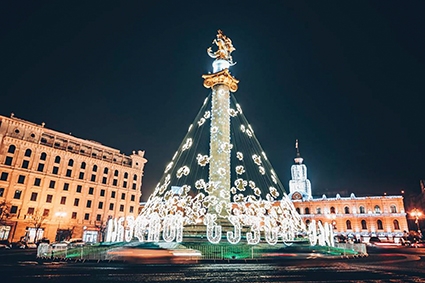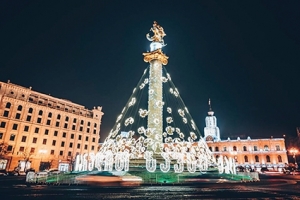City Full of Love, or...
Op-Ed
For Christmas, I had a couple of old friends from the US visiting with me in Tbilisi. They have been in love with Georgia since the end of the 1980s when we were extensively involved in all kinds of exchanges with America – business, cultural, sports, medical and journalistic. The Americans used to come over to stay with our families and we went to the States to spend time in American homes, mostly in the famous Peach State of Georgia whose mottos are ‘wisdom, justice and moderation.’
With Georgia on their minds, my guests came back to revisit their favorite sights of Tbilisi and its environs, and the first question they asked me when I took them for a glimpse of the gorgeously illuminated downtown was: “Why did you guys want to put that bilingual message in gigantic letters around your electronic Christmas tree? Just to tell the public that this city is full of love? It must’ve cost the earth, to say nothing of the pains taken by the city administration. Is the message that valuable and significant? No city in the world is full of love. Hate is in the same abundance as love everywhere!” I was a little nonplussed to hear the question and quickly came up with the excuse that the sturdy oversized slogan was only an emphatic reminder of what is most innate for our capital, and that is love. That said, I felt better and proceeded with entertaining the visitors.
I don’t really know how convincing I sounded, but about ten minutes after the first question was promptly answered, I heard another, this time about the weird-for-the-holidays structures which had been erected in front of the Old Parliament. My first reaction was to give a strong political speech, briefly explaining why those unsightly tents had been set up right in the middle of the main city thoroughfare, but then I thought that perhaps a witty nonchalant answer would be better to save the day. “Well, my friends,” I said, “it’s a little love and a little hatred to balance the Christmas moods in town so we can really appreciate life and be happy enough to celebrate the holidays.” No laughter ensued. Not even the faintest of smiles.
To escape the acutely inquisitive curiosity of my foreign friends, I thereafter became so voluble that nobody could get a single word in. When, finally, after the evening meal and drinks and my accompanying profuse gibberish, I took to bed physically tired and emotionally overwhelmed, and lay there contemplating my life – long enough to be worth reminiscences, but not quite long enough to stop worrying about the image and fates of the motherland. A lot has happened since we said no to the idea of communism and held up the prospect of capitalistic development. We have certainly changed as a community, but there are things that still linger on as socialist leftovers.
And now, following the train of my psychoanalytical thoughts, it’s my turn to ask a question: in what particular way would messages like ‘City Full of Love’ enhance our chance for a better life and boost our sense of happiness as the dwellers of this ancient urban development? How about those city folks who feel perpetual resentment instead of love due to chronic deprivation and lack of the resources needed to feel love rather than hate? Personally, I got the “love” message– I am a successful consumer of the fruits of love in general, but again, I have no need to be reminded that I am living in a place that is overflowing with the stuff.
Let me throw in one quizzical contrast here: if somebody who eagerly wants to pester the author of the slogan in question and the executors thereof put up somewhere within the city boundaries the contrary slogan ‘City Full of Hate,’ what would happen? Would the alternative slogan be just as lawful to carry? As the saying goes, there’s only one step from love to hate. So why does it make sense to put up either one or the other?
By Nugzar B. Ruhadze












